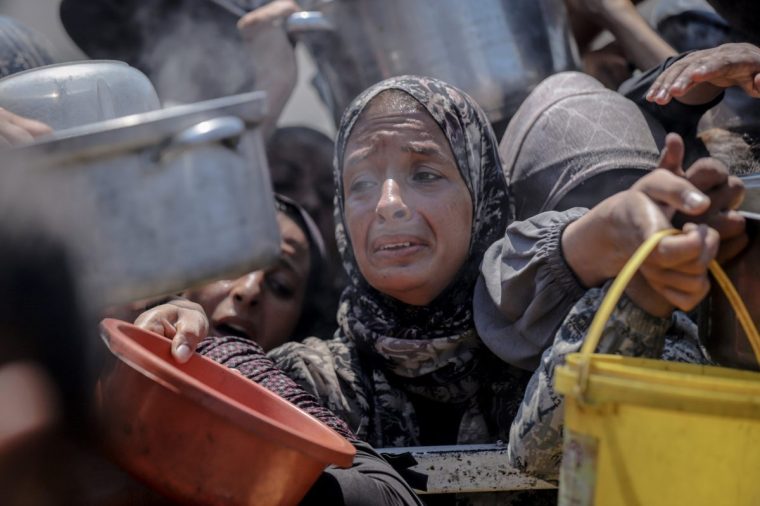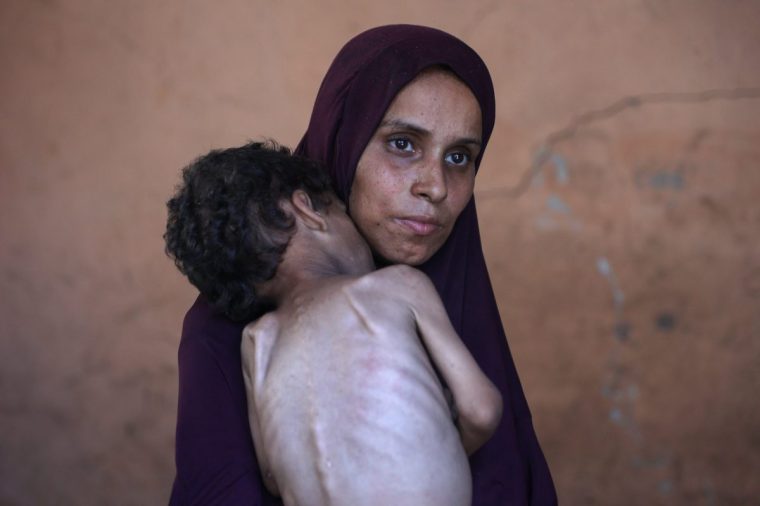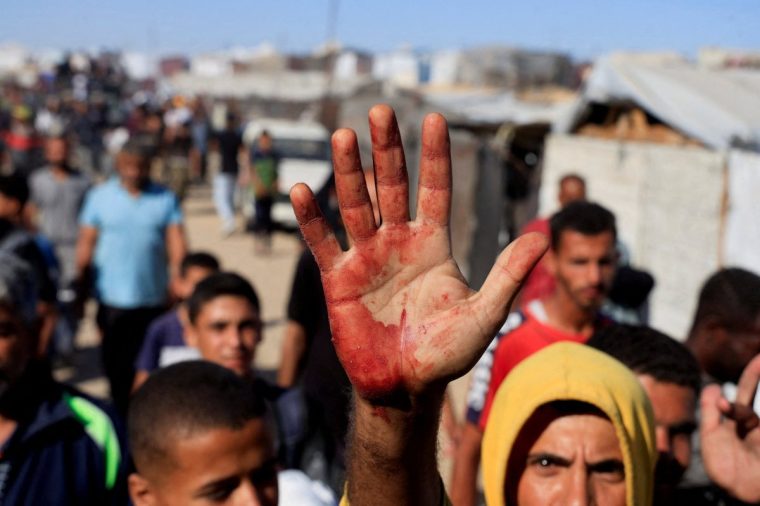An aid worker struggling to feed his family describes conditions inside the Strip as the UN says one in three Gazans do not eat for days on end
A crippling combination of fear and malnutrition means Gazans are now “walking on the streets like zombies”, an aid worker struggling to feed his family tells The i Paper.
Ramez Obaid, a father of two sheltering in the centre of the Strip, says Gaza has “turned into an open mortuary”, telling The i Paper: “You can smell death everywhere.
“I see lots of homeless children, sleeping on the streets and on roads. They’ve lost their whole families and have no one to support them. They’re starving and they spend their days trying to get food.”
Despite working as a humanitarian with international aid charity Islamic Relief, Obaid says he is struggling to provide one meal a day for his family.
“Some people can barely walk because they’re so weak from hunger. Their eyes are pale from malnutrition. Death stalks them,” he says.
“I see people walking on the streets like zombies because of fear and malnutrition. Some people can barely walk because they’re so weak from hunger. Their eyes are pale from malnutrition. Death stalks them.”
Almost one in three people in Gaza do not eat for days on end, the UN’s World Food Programme (WFP) said earlier this week, warning that “90,000 women and children in urgent need of treatment”.
The World Health Organisation (WHO) estimates that up to 20 per cent of pregnant women and around 10 per cent of all Gazans are experiencing either severe or moderate malnutrition.

Along with his wife and children, Obaid says he has been displaced 12 times in the last 20 months, repeatedly relocating to escape the bombing.
He is now renting a flat with eight family members and is the only one with an income.
“Every morning when I wake up, I expect to hear painful news about losing family members and friends. I open the news afraid that I’ll hear about new military orders forcing us to leave home again,” he says.
“My first thought when I wake up is how I’m going to get food for my family today.”
‘Human life has lost its value here’
It is a far cry from the happiness Obaid remembers before the war, when his life was “completely normal”.
His twin 12-year-olds – son Abdullah and daughter Malak, which means Angel – attended school and were learning English. As a family, they would visit friends on the weekend and go to the beach.
“We were full of hope for their future. We had food and a home and we just focused on improving our quality of life,” he says.

Now, he says it feels like “life has been frozen”.
“Our nice home in Khan Younis was bombed – first it was partly damaged, then later it was completely destroyed. Now there’s nothing left,” he says.
“Everything is destroyed – hospitals, schools, roads, the sewage systems. Houses are now just piles of rubble. Human life has lost its value – it’s become the cheapest thing here.”
‘A meal for my house can cost $100’
It has been “months” since Obaid and his family had meat, chicken, eggs or fresh vegetables.
“Most of what we can get is canned goods which are not healthy or nutritious. Our only source of protein is from lentils or beans,” he says.
“The scarcity means that even the food that’s available has become so expensive that I can barely afford it.
“A one kg bag of flour now costs about $27 which most people can’t afford. We can’t survive on just flour and bread – we have to buy other things. A meal for my household can cost $100 now.”
The head of the World Health Organisation has described the situation as “man-made mass starvation”.
It came as more than 100 aid organisations this week warned that Gaza’s population is “wasting away”.
Israel imposed a total blockade of aid deliveries to Gaza in early March before resuming its attacks on the Strip, ending a two-month ceasefire with Hamas.
It partially eased the blockade two months later, but the UN’s humanitarian chief said it was still only permitting “a drop in the ocean of what is urgently needed”.

Israeli officials have blamed Hamas for the hunger, saying restrictions have remained in place to ensure aid is not being diverted to the designated terrorist group.
On Saturday, Sir Keir Starmer confirmed he would “take forward” plans to airdrop aid and evacuate children requiring medical assistance in Gaza, according to Downing Street, after Israel said it would begin to allow foreign countries to “parachute aid” into the territory.
COGAT, the Israeli authority for aid in the Strip, said that Israel allows and facilitates the entry of humanitarian aid into the Gaza Strip and that close to 4,500 trucks had “recently” entered Gaza, including baby food.
The agency accused the UN of “ignoring” aid in Gaza, saying there has been a “significant decline in the collection of humanitarian aid from the crossings by international aid organisations”.
But Tess Ingram, who has been working in Gaza for Unicef, said that the agency’s requests for movements were frequently denied and that they are not granted safe passage to collect or distribute the aid.
At least 1,000 people have been killed in Gaza while trying to get food, the UN human rights spokesman Thameen Al-Kheetan told AFP on Tuesday.
A British doctor told The i Paper he feared Israeli soldiers were playing a deadly “game” with starving Gazans queuing up for aid, deliberately shooting different body parts on different days, something the IDF denies.
